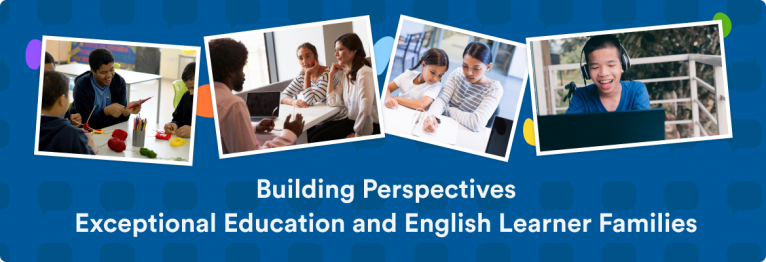At TalkingPoints, we know that building relationships across lines of difference is some of the most critical and rewarding work that educators do. From learning about your students’ rich cultural traditions to helping families navigate homework across language barriers, your efforts make it possible to have meaningful and joyful school-to-home connections. Your work also helps families access the great education their child deserves.
But authentic engagement between home and school can be challenging too. That’s why we’re here with a new blog series called Building Perspectives. Each post in the series offers insights and tips from educators on how to build relationships with families across cultural differences—and how to build the capacities of both teachers and families to support students and each other.
Exceptional education (EE) can be an academic lifeline for students with unique learning needs. From gifted and talented enrichment to special education services, EE encompasses the supports that many students need to reach their full potential.
Yet navigating the world of exceptional education–with its complex terminology, assessments and services–can be challenging for families. This is especially true for families who do not speak English and are unfamiliar with U.S. school systems.

Alicia Peters, a fourth grade teacher in the Metro Nashville School District, sees the power of exceptional education services firsthand. She also knows the difficulties that system can present for families of English Language Learner (ELL) students.
Nearly half of Peters’ current students are English Language Learners. Ten percent of her students receive EE or special education services, mostly in her general education classroom, where a paraprofessional provides additional support.
Below, Peters shares her strategies on how to help EL families navigate the world of exceptional education, no matter what their child may need.
Involve families at the beginning of any intervention
“Before we refer a student for special education testing we want to make sure that they are not struggling just with language learning or knowledge gaps,” says Peters.
If Peters notices a student having trouble, she offers extra support in class and reaches out to the students’ family about her concerns. If more help is needed, she calls in her school’s support team, who initiates an academic intervention process—one that may lead, after weeks of data collection, to a student referral for special education services.
“With all the paperwork and terms, this process can be pretty overwhelming even for parents who know the school system,” says Peters. “That’s why it’s so important to bring your EL families into your class community and teach them about this process. It really becomes an advocacy issue,” she adds.

Peters and her school support team make sure to invite parents to the first intervention meeting and provide translation services when necessary.
“We ask for their concerns and then share what we are going to try to do to help their student,” she says. This way, families feel supported and have an opportunity to ask questions as well.
Be intentional about keeping families in the loop
“Every five weeks the student support team meets and sends home a letter to the students’ family with progress updates, and to let them know if there will be a change in intervention,” says Peters. “But that sheet of paper can get lost in the shuffle, so it’s important to follow up with families as well.”
Peters uses TalkingPoints to let families know how their students are doing. Instead of waiting several days for her school or district office to translate intervention documents or progress monitoring reports, Peters can relay important updates to families in minutes.
“With TalkingPoints, I can establish a completely different dynamic between myself as an educator and the families of students I serve, especially when those students need extra support,” she says.
“With TalkingPoints, I can establish a completely different dynamic between myself as an educator and the families of students I serve, especially when those students need extra support.”
If a student is eventually referred for special education services, Peters and the support team, which includes a school psychologist, counselor, and social worker, arrange an individualized education program (IEP) meeting.
“We ask families if they would prefer to have an interpreter read the documents in their home language or if they would prefer to read it themselves,” says Peters, “which helps them feel supported right off the bat.”
The team also makes sure to explain the highly technical language of the IEP document and assessments to families, and connect the students’ results to challenges the student might show at home and in class–such as difficulties reading a book or completing a fraction problem.
Through this approach families better understand how special education services can help their child too. “They are really supportive of it,” says Peters, “especially when we tell them that their student can remain with their peers and get the help they need to succeed at the same time.”
Listen to families—they know their child best and want to help
“It’s hard to hear that your child is not progressing as much as they should be, but usually parents are very supportive once they learn what the extra supports will mean for their child,” says Peters about families of her EL students who qualify for special education.
Unfortunately, Peters has also seen families ignored in the process.
“One of my students had lost language proficiency and was having some learning challenges, so I called a meeting with one of his parents. She expressed concerns too, because she had other students who had graduated already and she knew her child was not where he needed to be academically,” says Peters.

Peters and her team provided class interventions but ultimately more was needed. Yet the family and teacher received pushback multiple times when they tried to obtain special education supports for the child.
“The student’s parent felt completely unheard in her concerns about her child and his failure to thrive academically,” Peters says. The parent ended up obtaining a state-appointed educational advocate, who was able to help her obtain an IEP for her child.
“Many parents don’t even know they have the right to reach out to an advocate,” Peters adds. Her hope is that EL families won’t have to feel that need at all, because school and district staff are doing everything they can to support them.
“Families are incredibly courageous and brave,” adds Peters. “They believe in their child and our school system and they show up, even when they aren’t sure if anyone else speaks their language. So that’s why you need to find out what your resources are and show up for them.”
“[Families] believe in their child and our school system and they show up, even when they aren’t sure if anyone else speaks their language. So that’s why you need to find out what your resources are and show up for them.” ??
If you’ve enjoyed reading this post of our Building Perspectives blog series and would like to comment or suggest a topic to add to the series, please reach out to us at hello@talkingpts.org or on any of our social channels. Don’t forget to follow us on Facebook, Instagram and Twitter for regular TalkingPoints updates and family engagement content.
Want to learn more?
TalkingPoints’ easy-to-use platform, interactive features, and precise translation in over 100 languages can provide game-changing solutions for bridging the home-school gap for teachers, school districts, and families. Learn more about our services here, and contact us at hello@talkingpts.org to learn more about how TalkingPoints can increase family engagement, improve home-school connections, enhance relationships between teachers and families, and support academic and social-emotional growth for every student.
For updates and news on what we’re up to, follow us on Facebook, Instagram, and Twitter. Check out our blog for free resources on remote learning and family engagement and see how other teachers are using TalkingPoints to make a difference in their students’ learning.



